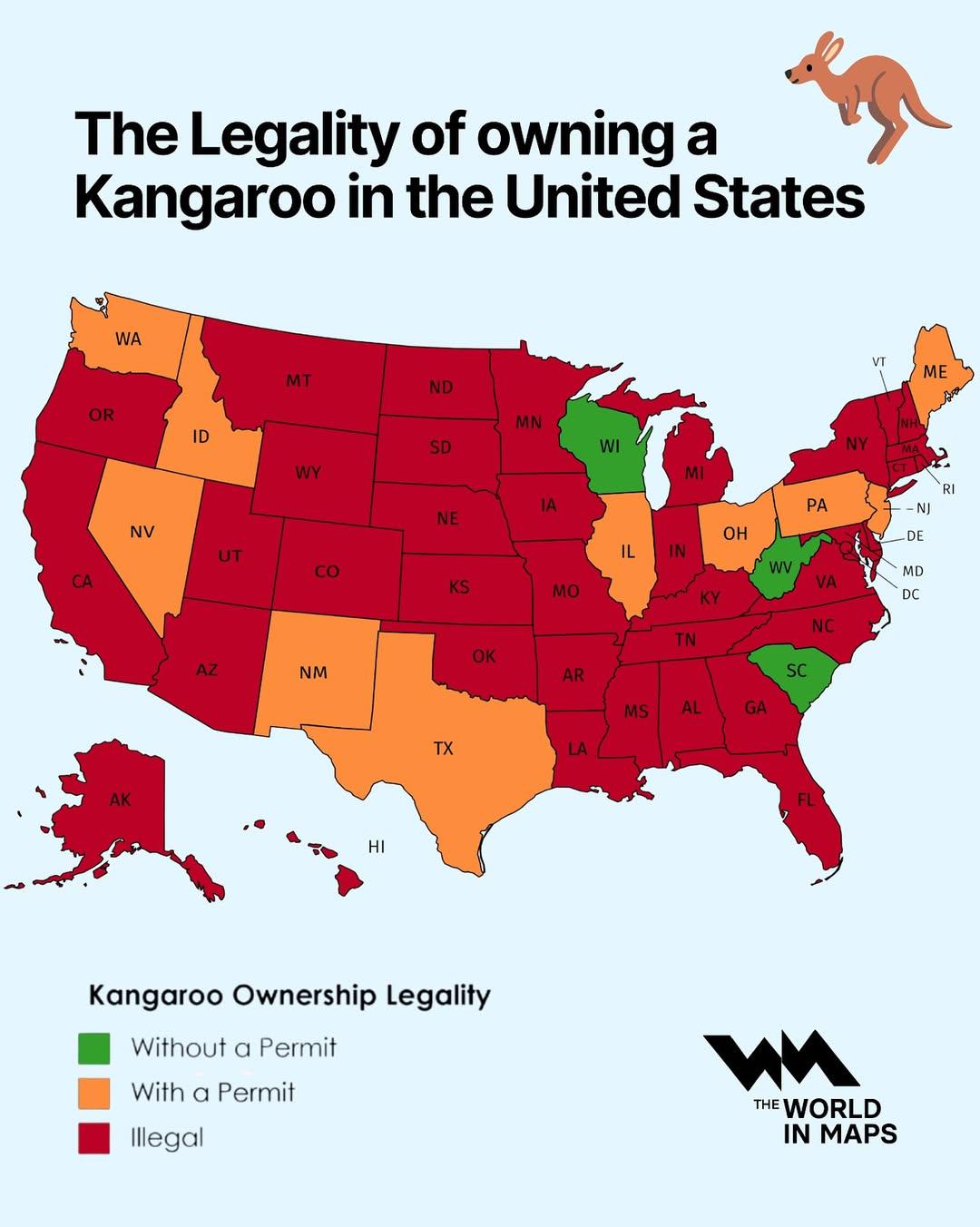Kangaroo Ownership Legality Map in the United States


David Chen
Data Visualization Specialist
David Chen is an expert in transforming complex geographic datasets into compelling visual narratives. He combines his background in computer science ...
Geographic Analysis
What This Map Shows
The map titled "The Legality of Owning a Kangaroo in the United States" provides a clear visual representation of which states allow private ownership of kangaroos and which do not. This unique visualization highlights the varying laws and regulations across the country, illustrating not just where kangaroo ownership is permitted, but also where it is restricted or entirely banned. Understanding these regulations is essential for anyone considering ownership of these iconic marsupials, as legal frameworks differ significantly from one state to another.
Deep Dive into Kangaroo Ownership Legality
Kangaroos, native to Australia, are fascinating creatures that have intrigued many animal lovers worldwide. However, owning one in the United States is not as straightforward as it might seem. The legality of owning a kangaroo often hinges on state wildlife regulations, which are designed to protect both the animals and the public.
Interestingly, there are currently only a handful of states where owning a kangaroo is fully legal. These states typically have fewer restrictions on exotic pets, allowing individuals to keep kangaroos as personal pets or for educational and conservation purposes. For example, in states like Texas and Nevada, the laws are relatively lenient, permitting ownership without a special license, provided the owner meets specific care requirements. In these states, kangaroos can be seen as part of a growing trend towards exotic pet ownership, reflecting a culture that embraces unique and uncommon animals as companions.
On the other hand, many states impose strict regulations or outright bans on kangaroo ownership. For instance, in California, kangaroos are considered restricted animals, and potential owners would need to navigate a complex permitting process that can be both time-consuming and costly. Other states, like New York and Illinois, have similar restrictions aimed at preventing the potential ecological impact and safety hazards associated with keeping large, wild animals in residential areas. The reasoning behind these laws is often tied to concerns about animal welfare, public safety, and the potential for invasive species issues.
In addition to state laws, local ordinances can further complicate ownership rights. Some cities may prohibit exotic animal ownership altogether, regardless of state regulations. Therefore, prospective kangaroo owners must be diligent in researching both state and local laws before considering such a unique pet.
Regional Analysis
Looking at the regional breakdown of kangaroo ownership laws, we can see stark contrasts across the United States. In the Southwest, states like Arizona and New Mexico tend to have more permissive laws regarding exotic pets, including kangaroos. This trend reflects a broader cultural attitude towards wildlife and pet ownership in the region, where exotic animals are often seen as part of the landscape.
Conversely, in the Northeast, states such as Massachusetts and New Jersey maintain some of the strictest regulations concerning exotic pets. In these areas, the focus on public safety and environmental protection often overshadows the desire for personal ownership of such animals. Interestingly, this reflects a larger national conversation about the ethics of pet ownership and wildlife conservation.
Moreover, the Midwest showcases a mixed bag of regulations. While states like Ohio have made headlines for their controversial stance on exotic animal ownership, others like Michigan have implemented more comprehensive regulations, requiring permits and inspections. This inconsistency can leave potential owners feeling confused and frustrated as they navigate the patchwork of laws.
Significance and Impact
The legality of owning a kangaroo in the United States is more than just a matter of personal choice; it speaks to broader themes of wildlife conservation, public safety, and ecological balance. As exotic pet ownership grows in popularity, the implications of these laws extend beyond individual states. They influence national conversations about animal rights, habitat preservation, and the responsibilities of pet owners.
Moreover, the future of kangaroo ownership in the U.S. may be shaped by ongoing debates surrounding animal welfare and conservation efforts. As awareness of environmental issues increases, we may see a shift in public perception regarding the ownership of exotic animals. This could lead to more stringent regulations or, conversely, a push for more responsible ownership practices that emphasize the welfare of the animals involved.
In summary, understanding the legality of kangaroo ownership in the United States provides insight into regional attitudes towards wildlife and the challenges of balancing personal freedoms with public responsibility. As discussions continue to evolve, those interested in exotic pets must stay informed and engaged, ensuring that their choices align with both legal requirements and ethical considerations.
Visualization Details
- Published
- August 16, 2025
- Views
- 168
Comments
Loading comments...